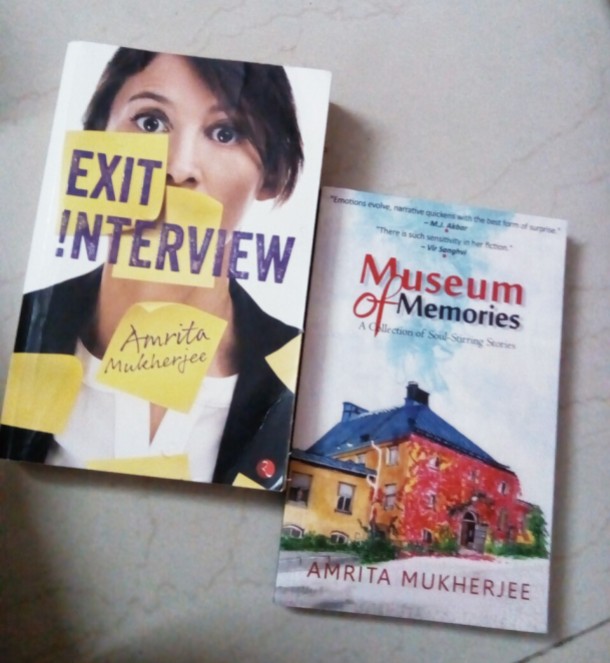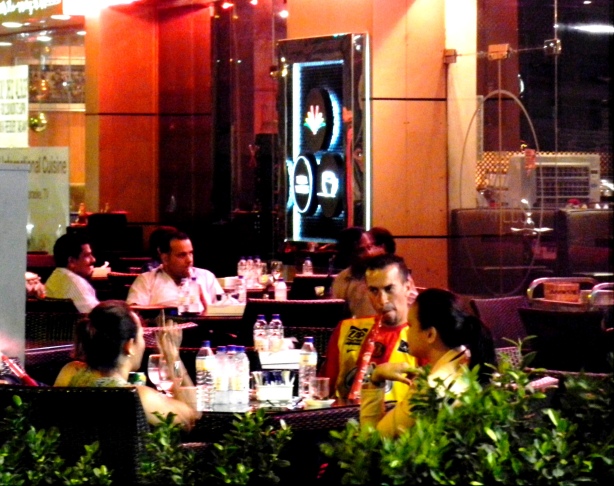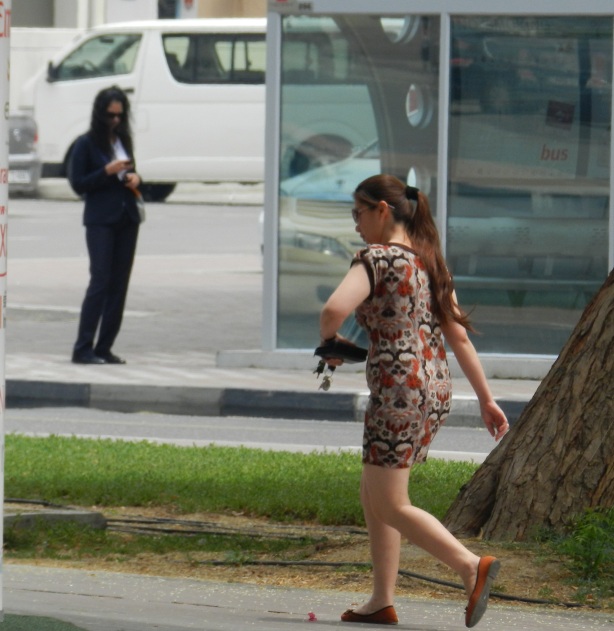 To give an insight into sexual harassment in the Indian media I got in touch with a number of my ex-colleagues, who are all currently well-placed in the industry to come forth with their views and personal experiences. Many said that they have never faced any kind of sexual harassment in the workplace, but have witnessed others facing it. Some men said that they have helped their female colleagues deal with harassment from the department boss and many said that they have faced harassment themselves. Some even said that certain senior people have tried to take advantage of their earlier professional relationship, long after they had stopped working together. Two ex-colleagues, one male and one female, said they have been harassed by their female bosses. A very senior male editor I was talking to yesterday told me in his entire career spanning almost 20 years, he has seen how men got transformed as they moved up the ladder and thought their higher posts also gave them the license to take their chances with women.
To give an insight into sexual harassment in the Indian media I got in touch with a number of my ex-colleagues, who are all currently well-placed in the industry to come forth with their views and personal experiences. Many said that they have never faced any kind of sexual harassment in the workplace, but have witnessed others facing it. Some men said that they have helped their female colleagues deal with harassment from the department boss and many said that they have faced harassment themselves. Some even said that certain senior people have tried to take advantage of their earlier professional relationship, long after they had stopped working together. Two ex-colleagues, one male and one female, said they have been harassed by their female bosses. A very senior male editor I was talking to yesterday told me in his entire career spanning almost 20 years, he has seen how men got transformed as they moved up the ladder and thought their higher posts also gave them the license to take their chances with women.
And while not everyone in this post has given their name, here it is then, all in their own words:
I told him he should not dare touch me again”- NUZHAT AZIZ
In my 14 years of work experience as a journalist in Kolkata, Mumbai and now Pune, there have been several experiences which have left me disgusted and annoyed. And in most of the cases, I have managed to put an end to the harassment by putting my foot down; by putting it across very bluntly, that I do not like the advances and am uncomfortable with what is being said or done.
During my stint with a leading daily, I had to work closely with a journalist who was hired to head a business supplement. The journalist in question had a habit of touching me whenever we spoke. Whether we discussed stories or it was a casual chat, his hand would either touch mine, or he would put his arm over my shoulder or around my waist. I did feel uncomfortable on several occasions and I discussed it with my female colleague.
One day we finished work and he asked me if I wanted to go to the club for some snacks. I agreed to go with him because I wanted to bring up this issue. While we waited for the drinks and snacks to arrive, he casually placed his hand over mine. I removed it and very sternly told him that I did not like anyone touching me. He was shocked and tried to defend himself. I repeated myself and took a cab home. The next day, he refused to talk to me and needless to add, he stopped assigning stories to me. I was perfectly fine with that.
There have been so many instances, where a male colleague has made a pass, cracked a sexist joke and commented on my vital statistics. All this is harassment. So if I were to write all of that, it would have to be compiled into a book. But I would definitely want to mention another incident, where this senior colleague would often send me text messages saying how hot he found me and later laugh it off as a joke. He would often tell us how he was in an open relationship with his wife.
He went on to hold a senior position with a foreign-based organisation. He continued messaging me with polite enquiries about my life and family and once in a while we would discuss about the media industry. In one such conversation he suggested I could get a senior position easily by sleeping around, because it was acceptable and everyone did pretty much the same. I was disgusted and offended and stopped responding to him. I unfriended him on Facebook. Sensing that I was upset, he later texted me saying that he did not mean such a thing and I was stupid enough to deduce something like that. I told him in as many words that I understood exactly what he meant and I was not keen to keep in touch.
My approach has always been take the bull by the horn, there are no two ways about it.
If I had not refused to get into the car with him he would have done something to me”- LM
There was this very senior editor, who was not only very talented, but also good looking and the no- nonsense types. We respected him immensely. When he handpicked me for a transfer to Mumbai I felt very proud and grateful. But after coming to Mumbai I lost touch with him. A few years later I bumped into him in my Mumbai office, we got talking and when he said he had nothing to do in Mumbai, I offered to take him out for dinner. We agreed to meet at a restaurant. He asked me to meet him at his hotel first. When I reached he asked me to go up his room. I wasn’t sure what to do but I went. We chatted in his room for sometime then left for the restaurant. It was a pleasant evening.
The next day he called me and asked me if I was free for dinner since he had another night in town. I didn’t think much of it especially since the previous night was really enjoyable, and hence agreed. He again asked me to meet him at his room when I reached the hotel. Once again I hesitated, but frankly, I was confused and went with the flow. This time I didn’t enjoy his company too much as he seemed to be a little tipsy. We had a light dinner and I said I had to leave because it was getting late. Very ‘casually’ he said, “you can stay back if you want.” I ignored this and just left after saying a polite goodbye.
A few months later he was in town again and called me, this time to his guest house. I was in two minds, but my gratitude for him made me decide to go. But when I reached, my instincts took over. He was already stark drunk and I refused to get inside his room. I told him we had to hurry to the restaurant because we had a reservation. Thankfully he listened. He had his chauffeur-driven company car. As soon as we entered the car, he grabbed my hand. My stomach did a somersault but I didn’t want to create a scene. My mind stopped working and I simply tried to make random conversation. All this while he was holding my hand and I was trying to withdraw it unsuccessfully. It might sound silly, but I just couldn’t think straight. Thankfully we reached the restaurant quickly. By then he was a mess and was even unable to stand. I just managed to finish dinner and he did the most bizarre thing – he started rocking the table and in between looked at me with stoned and lustful eyes. I don’t know how I managed to get out of there without creating a scene.
I insisted I had to leave and finally walked out of the restaurant with him following me. Outside, he crossed all limits. As I called the driver to get the car, he tried to embrace me. I quickly wriggled out and stepped aside (once again trying not to create a scene). Thankfully, the driver arrived on time, and with his help, I practically shoved him inside the car. I didn’t get in myself and I jumped into an auto rickshaw instead telling him I had to rush to another venue.
The way he was going I don’t know what would have happened if I had entered the car that night. I was actually his fan – as a junior reporter – but his behaviour was appalling. Probably, you may say I was at fault for going out with him thrice. But it did take me some time to realise that the Dr Jekyll I had known at work would turn into Mr Hyde after getting drunk.
It is possible to create a non-sexual atmosphere where predatory men are intimidated into decorum”- SURANJANA ROY BHATTACHARYA
I don’t recall a single instance of harassment, personally, between 1994-2008, the time I worked in India.
The only obnoxious person I have encountered was this person who was not my boss, but the editor of another department. Since in a newspaper office we mostly sit in an open office, you can see what’s going on in other departments. He would openly hit on the girls in that department. What struck me as brilliant was the way these women dealt with him. From a distance, it seemed to me that these young girls were capable of puncturing his ego, they patronised him and talked him down and kept him in line. I don’t know the actual dynamics, but that is what I perceived and sub consciously rejoiced.
What I am trying to say is that women can and do have ways to deal with men. I was 23 when I joined Indian Express, Bombay as a trainee. I worked night shifts with men who used to drink every night. Yet, not for a single night did I feel any discomfort. I have often thought why that was so, and the only explanation I found is – women can ‘de sex’ themselves and their environment. When you don’t recognise a man as the male of the species, when you don’t recognise his ‘aura’, that man will not have any power over you. I think it is possible for men and women to create a professional, non-sexual atmosphere where predatory men are intimidated into decorum.
My female editor would measure my derriere with her palm”- NAME WITHELD
Sexual harassment need not be physical or coming from a man. Women too can sometimes indulge in it. For example, my female editor would pass lewd comments on my derriere and offer to measure it with her palm to see if I have “put on weight”. In front of male colleagues, this would be thoroughly embarrassing. One night, on a team trip to a nearby resort, she dragged everyone out of their rooms to have a chill-out session. Then she announced to everyone: “X is not wearing a bra!” Her joke was so humiliating. Also, when I needed to take leave for a day because my then boyfriend was returning after a 4-month long trip from Europe, she said, in front of the whole department, “You can postpone your f****** by a day. I need you here at work.” Maybe it was my age that prompted her to say such stuff, thinking I was ‘too young to mind’ or it could be because she believed in the culture of ‘ragging juniors’, with or without realising she was crossing the line and humiliating me. But I mustered the courage to tell her one day that I felt insulted this way.
My friend was asked to perform oral sex”- SARAH SALVADORE
A friend of mine decided to leave journalism for good because of sexual harassment. As a young intern, when she approached her so-called ‘mentor’ to inquire about jobs, she was asked to perform an oral sexual act on him. She walked out immediately and decided to never step into any media house again. Today she is happily working in the literary field, “minus the creeps,” as she puts it.
The editor lost his job due to charges of sexual misdemeanor”- NAME WITHELD
I was working in a newspaper in Delhi and there was an editor and his entire team, who were extremely foul- mouthed in front of women. I was just on “hi” and “hello” terms with him but still he tried to touch me on many occasions. I had left the organization by then but I heard he eventually lost his job due to charges of sexual misdemeanor.
Many editors have got away with their antics because they were smart, Tejpal acted foolishly”- MOHUA FERNANDES
This kind of sexual harassment is not new in media circles. But it is important to highlight this issue because these editors – who think nobody can touch them and that they can even get away with murder – need to realise that they cannot get away with it every time. They need to practice what they preach, not just support an issue because it makes good copy. Look at their double standards: they cry hoarse when a photojournalist is gangraped by criminals, but when a respected editor violates his employee’s body against her wish, they call it consensual. Many editors have got away with their antics because they were smart. Tejpal acted foolishly, so he got caught. Personally, I have never faced any such harassment. But it is common knowledge that women in the media – like in other fields too – use their sexuality to climb the career ladder. That’s why very often mediocre employees get phenomenal promotions and perks. Of course, everybody else in office knows why.
I couldn’t muster the courage to report my senior colleague”- NAME WITHELD
I had started out as a trainee some nine years back with a leading Kolkata-based media house. The first time it happened was when I was asked out for coffee, to which I went ahead willingly as just another evening out with a colleague I knew well and interacted freely, not realising that was only the beginning of the mental harassment I was to face for months to come.
Five minutes into the conversation, I realised there was something wrong in the way the conversation was going. When I made it clear that I wasn’t interested in anything that he wanted out of me, and that he was just another male colleague, he said, ‘But women don’t come out for coffee with just any male friend. If she does she is plain available and has been asking for it’.
All of 22, I did not know how to react, what to say. All I knew was I walked out on him in the next five minutes. From there on began the stream of messages, morning, day and night, all of which threatened to malign me in public, full of cuss words, etc…if I opened my mouth or dared say a word. I could see a change in attitude in some other colleagues too, a smirk here, a snigger there. On one or two occasions, I did think of having a heart-to-heart chat with the boss and ask him for help, but a mere 8-month-old trainee’s account would perhaps stand no chance against the hoity toity. No, I couldn’t muster enough courage and kept mum sharing my shattered frame of mind with only a set of very close friends.
I was victimised in every possible way, dubbed incapable, inefficient, my copies not good enough, as it had to be passed through that one ‘male colleague’s’ coterie of people. I realised the root of the problem stemmed from that coffee at Flury’s.
I got a better job and moved on. But therein died a chirpy, easy-going 22-year-old, and emerged from the ashes a no-nonsense girl.
Tejpal incident would shake up a lot of people”- MOYNA SEN
Initially I did feel that maybe the Tejpal thing was being blown out of proportions for reasons best known to the people involved, simply because this was nothing new to the media world. But I guess the harassment issue had become so rampant, it needed to be addressed as well. More often than not these skirmishes are brushed under the carpet as run-of-the-mill incidents. Therefore this would hopefully nudge people out of their complacency, given that both Tejpal and his Tehelka are in serious trouble. Talking of myself, I cannot recall of very serious harassment issues. There have been insinuations, but nothing that I could not control by putting up an intolerant front. But I have seen some of my colleagues facing it, snide comments about their physical assets or even being propositioned directly. Some have been shocked, others have retorted and some have actually responded positively.
I went to meet him in his hotel room many times”- NAME WITHELD
He was an editor I had idolized all my life. I was just 21 when I met him at an office party and was over the moon for all the attention he showered me. Finally when he asked me to meet him in his hotel room the next day I said yes. From then on I went to meet him many times and he gifted me books and ordered champagne and we had romantic chats sitting in the balcony. But one thing is for sure. I never used my proximity to him to get a better position at work.
However, I soon realised I was falling in love with him and he was married. I thought if I could not dissociate myself I would be heading for disaster. I told him so and he did not force me to continue, neither did he victimize me in the workplace for not continuing. I soon moved abroad and we never met after that. At that point I thought I was the only woman he really liked but later on I came to know I was just one of the many.
This is a follow up of my earlier post Sexual harassment in Indian media: The inside story (PART I)

















